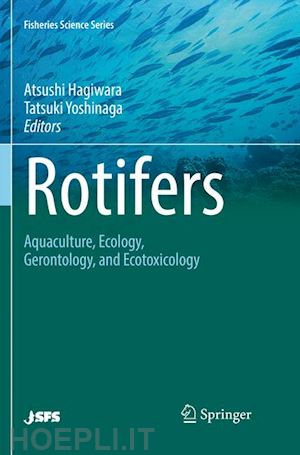

Questo prodotto usufruisce delle SPEDIZIONI GRATIS
selezionando l'opzione Corriere Veloce in fase di ordine.
Pagabile anche con Carta della cultura giovani e del merito, 18App Bonus Cultura e Carta del Docente
This book highlights the latest advances in rotifer studies in various fields including aquaculture, ecology, gerontology and ecotoxicology. The genus Brachionus are an indispensable type of zooplankton, having served as an initial live food for marine larval rearing since the 1960s. Their mass culture techniques have been intensively studied, and some essential achievements have been made – regarding high density culture, employment of valuable dietary algae, automated culture systems, and effective production of resting eggs. These have in turn supported stable and efficient aquatic seedling production for numerous important marine fish species including flounder, sea bream, and bluefin tuna. Further, this group is considered to be a suitable model for studying various aspects in ecology. A series of aquaculture and basic science studies have significantly advanced our understanding of the life history evolution. The studies in these two fields are closely
linked, and provide readers with comprehensive information on how rotifers are now being employed in biological investigations.Chapter 1. Taxonomy 1-1. Current status of morphological classification in aquaculture strains (Kotani, Hagiwara)1-2. Speciation and evolution of Brachionus (Snell, Serra, Fontaneto) Chapter 2.- Live food 2-1. Mass culture and preservation of Brachionus (Koiso, Kuwata, Hagiwara) 2-2. Enrichment of rotifers and its effect on the growth and survival of fish larvae (Kotani) 2-3. Utility of rotifers on the larval rearing of marine fishes cultivated under various conditions (Sakakura) 2-4.Other potential rotifer species as a live food (Ogata, Kurokura, Hagiwara) Chapter 3.- Model organism 3-1. Life history evolution in the rotifer (Stelzer) 3-2.Population dynamics in the rotifer (Yoshinaga) 3-3. Aging and lifespan in the rotifer (Kaneko) 3-4. Origin of sex: significance of sexual reproduction (Welch) 3-5. Ecological diagnosis (Suga, Snell) 3-6. Genomics (Suga, Welch, Lee).











Il sito utilizza cookie ed altri strumenti di tracciamento che raccolgono informazioni dal dispositivo dell’utente. Oltre ai cookie tecnici ed analitici aggregati, strettamente necessari per il funzionamento di questo sito web, previo consenso dell’utente possono essere installati cookie di profilazione e marketing e cookie dei social media. Cliccando su “Accetto tutti i cookie” saranno attivate tutte le categorie di cookie. Per accettare solo deterninate categorie di cookie, cliccare invece su “Impostazioni cookie”. Chiudendo il banner o continuando a navigare saranno installati solo cookie tecnici. Per maggiori dettagli, consultare la Cookie Policy.